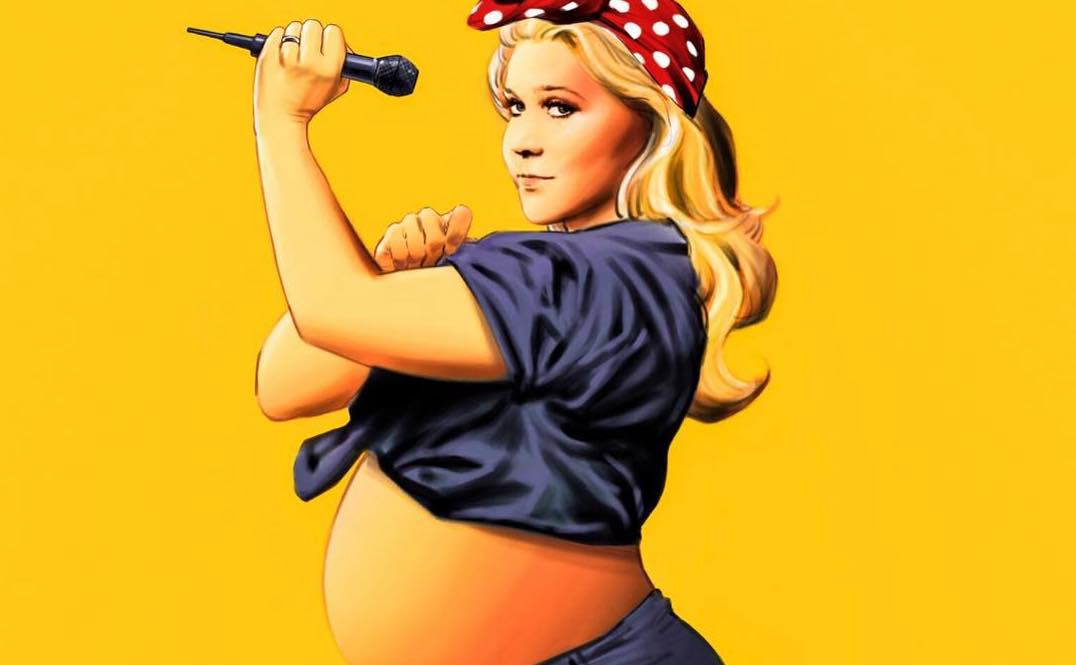Wickedly funny, relatable and absolutely fearless, Amy Schumer delivers a night of tear-inducing laughter once again in her hot comedy special, “Growing.” But this stand-up routine, which has been streaming on Netflix since March 19, is about more than just hilarious anecdotes and crude humor. Schumer manages to cram messages of personal growth, pregnancy, marriage and feminist empowerment in just an hour’s worth of material.
Known for her stand-up comedy specials and appearances on Comedy Central, “Saturday Night Live” and various other acting roles on TV and film, Schumer uses her commanding stage presence to say exactly what everyone is thinking but too afraid to say out loud. While this can come across as immature at times — I would argue that it is an artistic choice on her part — she also uses her comedic platform to comment on important social issues and current events.
She strikes a bright balance in “Growing” between irreverent tomfoolery and criticizing the institutionalized stigmas surrounding menstruation, autism and the pressures of gender norms.
When it comes to talking about her pregnancy, Schumer doesn’t just get real, she gets REAL. She pulls up her dress to show off her bellybutton to the audience, which has been taped down with Band-Aids, saying to the first few rows of people, “That’s more than you bargained for, right?”
Along with her tummy reveal, Schumer complains about all the unsaid aspects of pregnancy that many women face but never openly talk about. “I didn’t know that being pregnant could be really hard,” she admits, “because you b—— all lie about it. Women don’t tell you how hard it is. I should’ve googled it.”
Other favorite pregnancy features include the classic “cupping the bump” maneuver, and her struggle with hyperemesis, a condition involving extreme nausea and vomiting that can lead to severe dehydration and weight loss. “If you’re someone who enjoyed being pregnant,” says Schumer, “I just hope your car flips over. That’s what I wish for you.”
Along with her honesty about her pregnancy, Schumer was refreshingly open about her husband Chris Fischer’s recent autism diagnosis and assured the audience that it was what made him different that made her fall in love with him. His inability to lie, which sounds like a wonderful quality in a partner, often leads to less than ideal social situations. For example, when she asked if her clothing looked okay, Fischer would reply, “You have other clothes, go try them on.”
She received a lot of questions about why she made his diagnosis public, and during an appearance on “Late Night with Seth Meyers,” she explained how she hoped that by being open about the common reality of autism spectrum disorder, it can reduce the stigma surrounding autism. She wants to encourage people to get tested, because after diagnosis, families can then be equipped with the tools and knowledge to live life more easily with autism.
She proceeds to comment on periods and the sad reality that women in American culture today are made to feel ashamed about getting their period, despite the fact that menstruation is a normal and necessary fact of life for half of the world’s population. The most embarrassing thing for a 12-year-old girl is for someone to find out that they have their period, which then extends into adulthood and pretty much for the rest of their life, whereas a 12-year-old boy suffers unwanted erections and then grows up and shows them to the world!
This odd and rather explicit example gets to the point of a lot of Schumer’s jokes in “Growing.” Her commentary on feminism and gender inequality is easily understood by audiences thanks to her fabulous use of sarcasm. “Who do we [women] think we are, men? Come on. Decisions are hard! Rights are heavy!”
Social taboos, such as how unacceptable it is when women get their periods, establish a kind of separation between genders that is not easily amended. The norms are norms simply because society says so; that doesn’t make them right and also makes them that much harder to combat.
Schumer expresses her gratitude for a new generation of women who say, “We [society] need to start from scratch” and begin asking the right questions in regard to women’s rights. This new generation symbolically strides over to Schumer and the implied older generation and asks, “‘Hey have you been getting sexually harassed like this your whole lives?’ and we’re like, ‘Oh, yeah’ and they’re like, ‘Yeah you wanna do something about that?’ and we’re like, ‘Oh YEAH!’”
It is this kind of initiative that Schumer wants her future child to see and is part of the reason why she was arrested in Washington, D.C., this past October while protesting the confirmation of Supreme Court Justice Brett Kavanaugh. Jokingly claiming that she was more worried about eating enough snacks than being detained, what Schumer really wants to say is that if there is going to be any real forward motion in the United States regarding the rights and equal treatment of women, people need to show up and stop giving men who hurt women positions of authority over others.
While managing to curse within the first 60 seconds of “Growing” and continuing with crude, occasionally abrasive humor for the rest of the evening, Schumer’s material is still powerful and touching. She equally makes fun of herself and encourages others to not be afraid of what makes them different, whether that be autism, a child growing inside you or only shaving up to your knees because that’s what your mom told you to do as a child.
















